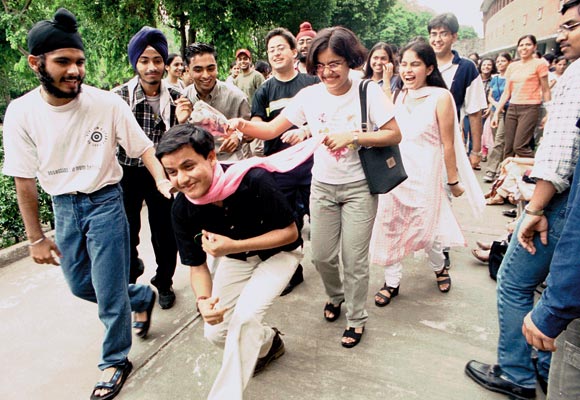 | « Back to article | Print this article |
Ragging = CRIME: Know your rights
Perpetrators can be charged with offences punishable under the Indian Penal Code. A listing of helplines and advice.
Class 11 student of Gayatri Junior College in Vijayanagaram, AP, was throttled so badly by seniors in her hostel on July 19, 2012, that she lost her voice.
At Burdwan University, West Bengal, on November 9, 2011, a student was accused by her seniors of stealing mobile phones and beaten up.
And at SRM University's Ghaziabad campus on August 15, 2010, a BTech student was pushed off the fourth floor of his hostel by a group of seniors.
Acts of humiliation
Ragging occurs in many forms. Some examples are: dress code-related (dictating what students must wear), verbal abuse (caste, class, other prejudices), silly acts to be performed (climb tree, shout, marry your classmate), sexual abuse (asking students to shed clothes), financial abuse (paying bills), physical abuse (carrying bags, finishing extra assignments), mass ragging sessions (juniors being asked to stand on benches, etc). Besides physical fatalities, these incidents cause a lot of emotional trauma. "Victims experience conflicting emotions like a sense of betrayal, incompetence, powerlessness and self-destructiveness," shares Dr Shekhar Sheshadri, Professor of Child Psychiatry at NIMHANS, Bangalore.
Ragging = CRIME: Know your rights
24-hour helpline for students
As per the Raghavan Committee's recommendations in 2009, the Supreme Court passed an order to put in place a regulatory mechanism. A 24x7 toll-free helpline (under UGC) was launched to give assistance within 24 hours. Prof. Rajendra Kachroo, who founded Aman Satya Kachroo Trust (ASKT) after losing his son in a brutal case of ragging, played a critical role in establishing the helpline along with anti-ragging groups. But they uncovered several loopholes in the process; delays of 24-48 hours for complaints to reach authorities and forcing victims to reveal their true identity as well as that of the culprit, which is not a practical expectation. The delays worsened the plight of victims, and a report by Society Against Violence in Education (SAVE) indicated that of one lakh students who call every month, only a few get any positive response.
Revamping the helpline
In January 2012, the govt. approved ASKT to monitor the call centre. Prof. Kachroo says students can now lodge complaints anonymously and the complaint will be reported to the college authority within 15 minutes. "We have installed caller recording machine and a software to create a database of student and college details," he shares. Through the mandatory affidavits filled by parents and students, the helpline will be able to monitor perpetrators closely.
Ragging = CRIME: Know your rights
Worst affected students
There is a trend of ragging being most common in highway colleges located far from main cities, as reach of media and anti-ragging groups is minimal," shares Harsh Aggarwal, Co-Founder, Coalition to Uproot Ragging from Education (CURE), a Delhi-based NGO, which conducts direct appeal campaigns and online counselling for victims of ragging.
CURE forwards student complaints to the authorities without revealing the identity of the student. "Typically, colleges suppress incidents for fear of losing their own image," he adds. According to Dr Kachroo, maximum calls for the helpline come from Orissa, Bihar, West Bengal, Uttar Pradesh and Madhya Pradesh and severe forms of ragging also happen in residential colleges where students reside together 24x7.
Ragging = CRIME: Know your rights
The 'seniority syndrome'
A very high proportion of calls are received from medical colleges as compared to engineering colleges," says Prof. Kachroo. The helpline's statistics indicate that of the 250 medical colleges, there is ragging at 100 of them. Prof. Kachroo outlines one of the main reasons.
"Primarily in medical colleges, young doctors are dependent on senior doctors who get sadistic pleasure by putting juniors down. This leads to heinous acts. The college staff should closely monitor these relationships, and mentor juniors," he adds.
Ragging = CRIME: Know your rights
Action by institutes
Some institutes are also resorting to stricter action. Dr Anand Samuel, VIT University's Vice Chancellor shares, "Last year a student was called to a senior's room. Before he could be harmed by the senior, we caught him red-handed and rusticated him the next day." For the initial two months of the new academic year, VIT outsources extra guards and deploys one security guard on each floor of the 15-storey hostel block. If they find any glitch they will soon call internal helpline handled by student welfare officer.
"We have a proctor system -- every teacher is allotted 15 students who will meet on regular basis and discuss day-to-day challenges." IIT Kanpur has a new ru#8804 students have to sign a declaration that they would not be involved in any kind of ragging activities or else face severe punishment.
"We have installed CCTV cameras outside the college and asked the Delhi Police to patrol, regularly. Mild altercation in the campus is dealt with by ourselves.
If there is something major, we immediately call the police," says Dr. Hemalatha Reddy, Principal, Venkateshwara College, Delhi. Many institutes, however, are yet to set up the mandatory anti-ragging cell that was recommended long back.
Ragging = CRIME: Know your rights
Perpetrators also victims
Dr Samuel feels that in some cases the perpetrator may be a victim of psychological disorders, using ragging as a release. Colleges must engage them in outdoor industry-based projects or extra-curricular activities to prevent such situations.
How you can help
When you come to know of abuse through ragging, rush the victim to the hospital if there are injuries. Dr Sheshadri shares that healing takes time. Victims must be encouraged to get adequate rest and relaxation. Writing a diary and talking to someone you trust, like close family can help. "But chances of healing are faster when a student gets reassurance of systemic intervention on campus by putting healthy regulations in order," he adds. Archana Nair, President, Leaders for Tomorrow (NGO) concludes, "Be your own watchdog"!




